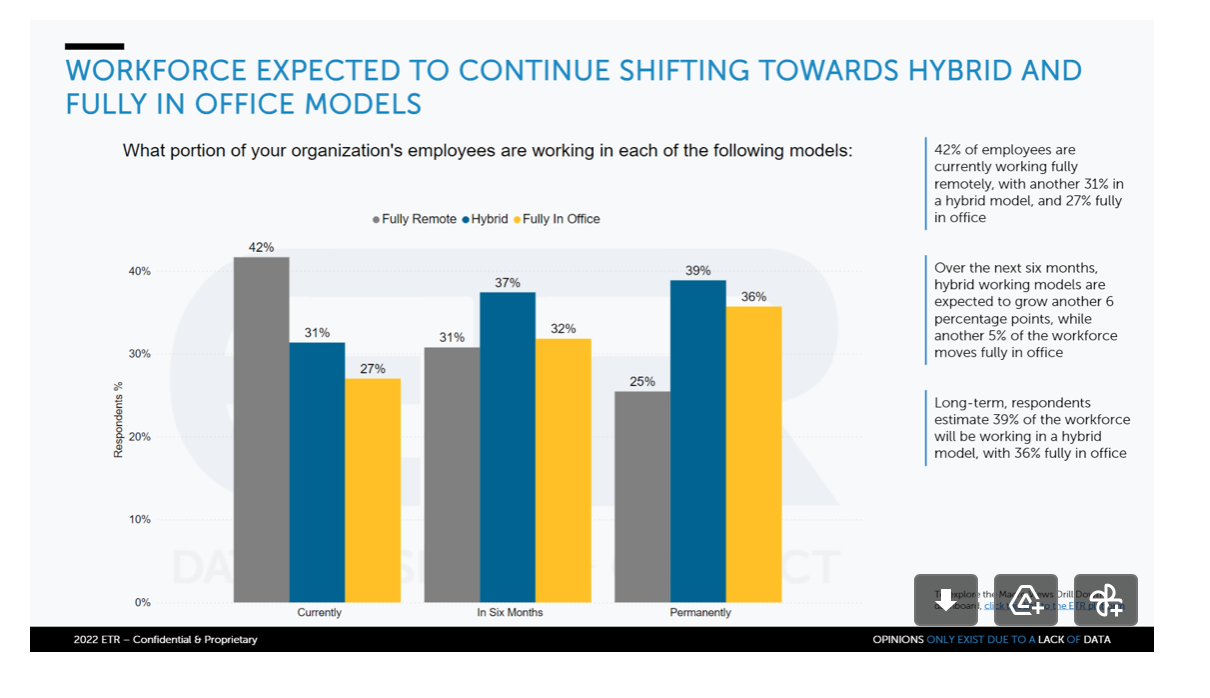ETR Technology Survey Cites Cybersecurity as Highest Priority for IT Spending
A quarterly survey of IT decision-makers shows tech hiring at an all-time high, and work-from-home will affect 64% of the workforce
According to the U.S. Bureau of Labor Statistics, more than 667,600 IT jobs are expected to be added between 2020 and 2030, a 13% growth rate.
“Cybersecurity continues to be cited as the highest priority since the pandemic, with ransomware attacks alone up 150% in 2021, and 61% of malware is targeting remote workers. “
Enterprise Technology Research (ETR), a technology market research firm, released its latest Technology Spending Intentions Survey (TSIS). The TSIS shows cybersecurity leads as the highest IT priority, followed by a significant increase in network spending. The survey also reveals that tech hiring is at the highest levels ever reported in TSIS, and 64% of the workforce will embrace some form of remote work permanently.
Designed to provide quantitative data to predict IT spending, the TSIS is issued four times each year. The current TSIS polled 1,200 IT decision-makers, including 33% of respondents at the C-suite level and 45% at the vice president or director level. Highlights from the survey include:
Second-quarter growth in IT spending is projected to be 5.5%, down from a projected 6.8% growth a survey ago; total IT spending projections for 2022 are at 6.7% overall growth, down from 8.3% projected the last survey.
Cybersecurity is cited as the highest priority for IT professionals, followed by cloud migration.
Network spending saw a jump in spending intentions and has been rising since September 2021.
Surprisingly, the industry sector projecting the highest spending is Energy & Utilities, which is traditionally very conservative.
Erik Bradley, ETR
“Technology budgets are continuing to shrink for larger enterprises, and we are seeing slightly stronger growth among SMBs,” said Erik Bradley, Chief Strategist at ETR. “Cybersecurity continues to be cited as the highest priority since the pandemic, with ransomware attacks alone up 150% in 2021, and 61% of malware is targeting remote workers. The massive proliferation in attacks and the need to support remote workers has created new security concerns which partially account for the increased focus on security. We also are starting to see work-from-home numbers stabilize, which may account for the rise in network spending.”
TSIS also shows changing trends in IT hiring. Its latest report shows demand for skilled IT talent to be at the highest levels recorded by ETR. According to the U.S. Bureau of Labor Statistics, more than 667,600 IT jobs are expected to be added between 2020 and 2030, a 13% growth rate.
ETR is also the first company to track work-from-home trends among IT decision-makers starting in March 2020. The current TSIS report shows that 42% of IT employees are fully remote, 31% are working at home and in the office, and 27% are back in the office full-time. The survey shows that permanently remote IT workers will stabilize at 25%, and employees with a hybrid model will stabilize at 39%, which is a dramatic shift from the pre-pandemic labor model.
To read more, please visit: https://etr.ai



